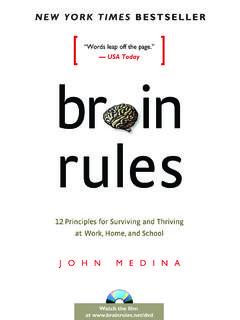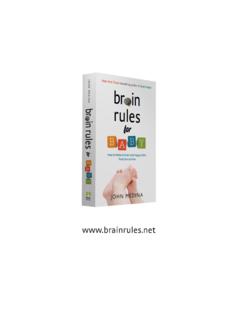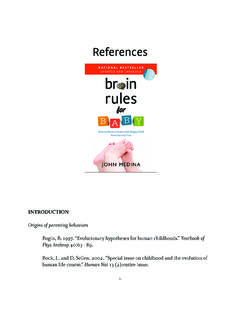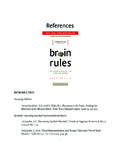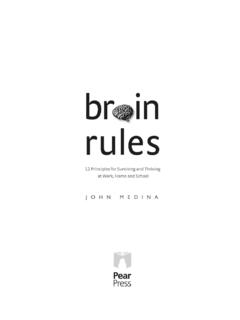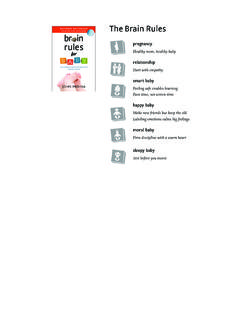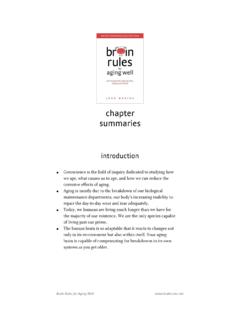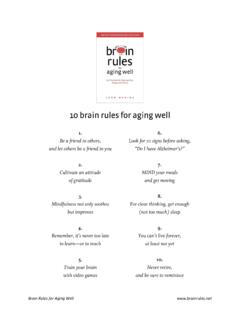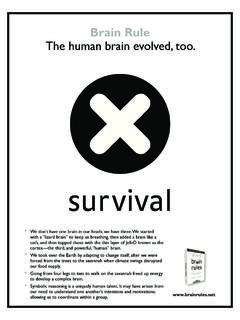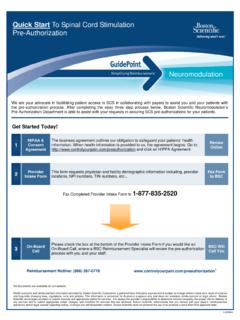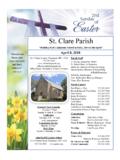Transcription of 12 Principles for Surviving and Thriving at Work, Home ...
1 12 Principles for Surviving and Thrivingat Work, Home, and SchoolJOHN Paperback (April 2009) 320 pages 6 1/8 9 1/4 ISBN-10: 0-9797777-4-7 ISBN-13: 978-0-9797777-4-5US $ $ (includes link to Brain Rules video)Other editions:Hardcover (March 2008) 320 pages 6 1/8 9 1/4 ISBN-10: 0-9797777-0-4 ISBN-13: 978-0-9797777-0-7US $ $ (includes Brain Rules DVD)Audio book (CD - Unabridged)ISBN-10: 0-9797777-1-2 ISBN-13: 978-0-9797777-1-4US $ $ (includes Brain Rules DVD)Also available electronically in many : Please contact your Perseus sales rep, or call publicity, contact Andrew Palladino, 917-848-7480 Pamela Cannon, 917-930-1685 For all other inquiries, contact Mark Pearson at 206-730-2463 or more at & contact detailsBrain Rules: 12 Principles for Surviving and Thriving at Work, Home, and Schoolby John Medina (Pear Press/Perseus Books Group)FOR IMMEDIATE RELEASE Contact: Andrew Palladino 917-848-7480 Contact: Pamela Cannon 917-930-1685 "John Medina's new book, BRAIN RULES, dissects the workings of the brain in plain English, explaining its role in the workplace and classroom.
2 What could be a daunting subject becomes enjoyable through a writing style that makes words leap off the page. - USA today Multitasking is the great buzz word in business today , but as developmental molecular biologist Medina tells readers in a chapter on attention, the brain can really only focus on one thing at a time. This alone is the best argument for not talking on your cell phone while driving. Medina presents readers with a basket containing an even dozen good Principles on how the brain works and how we can use them to our benefit at home and author employs an appealing style, with suggestions on how to apply his Principles , which should engage all readers. - Publishers Weekly 12 Principles for Surviving and Thriving at Work, Home, and School By Dr. John Medina Renowned molecular biologist John Medina takes readers on a journey into the inner workings of the brain, revealing the ways we can most effectively improve our lives at school, work and home.
3 Medina s non-traditional arguments and proven insights can be found in his highly acclaimed BRAIN RULES: 12 Principles for Surviving and Thriving at Work, Home, and School, now available in paperback (April 2009; Pear Press/Perseus Books Group; $ ). Filled with fascinating case studies and findings, all made accessible through Medina s humorous tone and perspective, BRAIN RULES offers readers tips and theories on how they can get the most practical benefits from their brains, such as improved cognition, brain power and productivity. Would you wear gym clothes instead of a suit to your next board meeting? Dr. John Medina, a molecular biologist at the University of Washington School of Medicine and the director of the Brain Center for Applied Learning Research at Seattle Pacific University, thinks that is exactly what you should do! Why? Because we know that exercise boosts brain power (Brain Rule #1). In a recent issue of Harvard Business Review, Medina outlines a brain-friendly workplace where board meetings are conducted on treadmills and desks are equipped with stationary bicycles.
4 Medina says, In a competitive climate, exercise is as close to a magic productivity bullet as you ll get. The magazine selected Medina s work on exercise as one of its breakthrough ideas for 2008. Medina s breakthrough work doesn t stop there. He combines all the latest research on the brain s performance envelope with real-world ideas of how we can change the way we work and learn in BRAIN RULES. In each chapter, he describes a brain rule what scientists know for sure about how our brains work, presents the science supporting each, and then offers ideas for how the rules might apply to everything we do, especially in our workplace and schools. Medina s passion for brain science is contagious. The book is packed full of fascinating stories, enlightening case studies, and humor, making it accessible to all of us. A helpful summary of each brain rule is included at the end of each chapter. Along the way you ll discover: There is no greater anti-brain environment than the classroom and cubicle.
5 Multi-tasking is a myth. Research shows your error rate goes up 50% and it takes you twice as long to do things. It takes years to consolidate a memory. What you learned in first grade is not completely formed until your sophomore year in high school! Medina s dream school is one that repeats what was learned, not at home, but during the school day, 90-120 minutes after the initial learning occurred. Taking a nap at 3PM might make you more productive. In one study, a 26-minute nap improved NASA pilots performance by 34 percent. Sleeping is powerfully linked with the ability to learn. Stress damages virtually ever kind of cognition that exists. The stress you are experiencing at home will affect your performance at work, and vice versa. It is so easy to forget and so important to repeat new knowledge. In partnership with the University of Washington and Seattle Pacific University, Medina tested Brain Rules in real classrooms of 3rd graders. They were asked to repeat their multiplication tables in the afternoons.
6 The classrooms in the study did significantly better than the classrooms that did not have the repetition. If brain scientists get together with teachers and do research, we may be able to eliminate the need for homework since learning would take place at school, instead of at home. And so much more! In addition, there are interactive tutorials for readers at , making it easy to jump from the book to the online video, featuring Medina s lively tour of the 12 brain rules. Medina has put all his research into BRAIN RULES, a user-friendly guide which Publishers Weekly attests should engage all readers. For the Brain Rules DVD trailer, YouTube videos, high resolution photos, excerpts from the audio book and more, visit: # # # About the Author Dr. John J. Medina is a developmental molecular biologist and research consultant. Medina holds joint affiliate faculty appointments at the University of Washington School of Medicine, in its Department of Bioengineering, and at Seattle Pacific University, where he is the director of the Brain Center for Applied Learning Research.
7 In addition, Medina was the founding director of the Talaris Research Institute, a Seattle-based research center originally focused on how infants encode and process information at the cognitive, cellular, and molecular levels. In addition to Brain Rules, Medina s books include: The Genetic Inferno, The Clock of Ages, Depression, What You Need to Know About Alzheimer s, The Outer Limits of Life, Uncovering the Mystery of AIDS, and of Serotonin, Dopamine and Antipsychotic Medications. Medina is also the regular Molecules of the Mind contributing columnist for Psychiatric Times. He lives in Seattle with his wife and sons. BRAIN RULES 12 Principles for Surviving and Thriving at Work, Home, and School By John Medina Pear Press/Perseus Book Group; Publication Date: April 1, 2009 ISBN: 978-0979777745; Pages: 320; Price: $ Visit Publicity Contact: Andrew Palladino 917-848-7480 or Pamela Cannon 917-930-1685 Praise for BRAIN RULES 12 Principles for Surviving and Thriving at Work, Home, and School John Medina's new book, BRAIN RULES, dissects the workings of the brain in plain English, explaining its role in the workplace and classroom.
8 What could be a daunting subject becomes enjoyable through a writing style that makes words leap off the page. - USA today BRAIN RULES is a highly readable guide to using the latest neuroscience research to improve your life and work. Medina s prose never overwhelms the lay reader with jargon but still manages to convey the scientific underpinnings of his recommended strategies for enhancing learning, health, memory, and more. Remarkably, this molecular biologist is a gifted communicator who is able to write for both the scientist and the layperson. - Psychiatric Times Few people are better qualified to help managers sift through all the hype than John Medina. - Harvard Business Review Oliver Sacks meets Getting Things Done. - Cory Doctorow, co-editor of Boing Boing A marvelous job in simplifying the best ways to get the most out of our brains. He is funny, tender, and completely engaging. Everyone should read this book. - John Ratey, MD, author of Spark and A User's Guide to the Brain BRAIN RULES is one of the most informative, engaging, and useful books of our time.
9 - Garr Reynolds, author of Presentation Zen the 12 brain rulesexerciseRule #1: Exercise boosts brain power. survivalRule #2: The human brain evolved, too. wiringRule #3: Every brain is wired differently. attentionRule #4: We don t pay attention to boring things. short-term memoryRule #5: Repeat to remember. long-term memoryRule #6: Remember to repeat. sleepRule #7: Sleep well, think well. stressRule #8: Stressed brains don t learn the same way. sensory integrationRule #9: Stimulate more of the senses. visionRule #10: Vision trumps all other senses. genderRule #11: Male and female brains are different. explorationRule #12: We are powerful and natural DR. JOHN MEDINA AUTHOR OF BRAIN RULES DR. JOHN J. MEDINA is a developmental molecular biologist focused on the genes involved in human brain development and the genetics of psychiatric disorders. He has spent most of his professional life as a private research consultant, working primarily in the biotechnology and pharmaceutical industries on research related to mental health.
10 Medina holds joint affiliate faculty appointments at Seattle Pacific University, where he is the director of the Brain Center for Applied Learning Research, and at the University of Washington School of Medicine, in its Department of Bioengineering. JOHN KEATLEY Medina was the founding director of the Talaris Research Institute, a Seattle-based research center originally focused on how infants encode and process information at the cognitive, cellular, and molecular levels. In 2004, Medina was appointed to the rank of affiliate scholar at the National Academy of Engineering. He has been named Outstanding Faculty of the Year at the College of Engineering at the University of Washington; the Merrill Dow/Continuing Medical Education National Teacher of the Year; and, twice, the Bioengineering Student Association Teacher of the Year. Medina has been a consultant to the Education Commission of the States and a regular speaker on the relationship between neurology and education.

